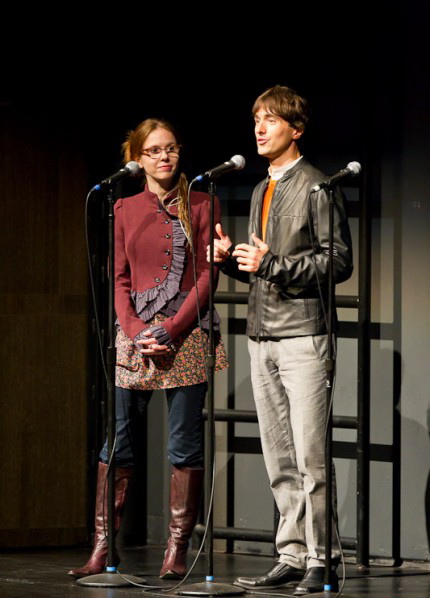Bates and Clyne wrap five years with final MusicNOW program

The final MusicNOW program of the season marked the conclusion of stewardship by Mason Bates and Anna Clyne of the Chicago Symphony Orchestra’s new music series. Curating duties will now pass to Samuel Adams and Elizabeth Ogonek, the CSO’s new composers in residence, who begin a three-year term this fall.
Under the direction of Bates and Clyne, the choice of composers for MusicNOW over the last five years sometimes seemed to reflect their own stylistic sympathies—with works heavy on electronics—rather than a broader swathe of contemporary music. Still, the pair deserve great credit for making the events more user-friendly to a younger crowd—the post-concert beer and pizza didn’t hurt—and vastly increasing audience attendance at these events. That’s no small achievement for a contemporary music series, especially with an increasingly conservative downtown audience.
Neither Bates nor Clyne were represented on Monday night’s program at the Harris Theater—one can catch the final CSO performance of Clyne’s The Seamstress tonight—but the lineup was reflective of concerts under their aegis, with vital and polished performances of a variable array of music.
The evening led off with Marc Mellits’ Octet, which proved the most rewarding discovery of the evening. Written largely in Banff in 2010 for double string quartet forces, the work is well crafted with idiomatic string writing, accessible without being simplistic.
A driving, insistent first movement opens in bracing fashion with shifting syncopated rhythms. The second movement offers a nostalgic melody for solo violin and cello–warmly played by Yuan-Qing Yu and Kenneth Olsen—which is then taken up by the other strings. The third and fourth movements feel a bit like sequential finales, but the angular riffs and forward impetus of this energetic music were maintained to the coda in an incisive and dynamic performance under Cliff Colnot’s direction. The composer was on hand to share in the enthusiastic applause.
The middle of Monday’s program offered a pair of virtuosic solo showpieces by two of our most compelling composers, though neither work shows them at their best.
The first movement of Esa-Pekka Salonen’s Dichotomie for solo piano was performed by Winston Choi. Inspired by Jean Tinguely’s bizarro sculptures, the subtitle “Mecanisme” says it all—spiky Stravinskyisms and off-center accents mixed with the aggressive keyboard bravura of Prokofiev. The music is less individual than most of Salonen’s work, but Choi delivered a galvanic, full-metal performance that received the loudest ovation of the night.
The centuries-old association of the violin with the devil–and Paganini’s fiddle diablerie in particular—inspired John Zorn’s Goetia for solo violin. Yuan-Qing Yu elected to perform five of the eight brief “incantations” (numbers 1, 3, 4, 5 and 8). The CSO’s assistant concertmaster brought plaintive expression to the theme of the first section and blazed through the ensuing variations’ minefield of difficulties—moto perpetuos, high, hard pizzicatos, and rapid-fire passages—with daunting fire and commitment. Yet Zorn’s work ultimately adds up to less than the sum of its showy parts.
The concert concluded with a genre-crossing finale as jazz pianist-composer Myra Melford performed two works of hers—The Large Ends the Way and The Whole Tree Gone— backed by a seven-piece ensemble.
As with most attempts by jazz artists to merge their freeform style with through-composed classical, the results were largely unconvincing. The rhythmic classical elements seemed to exist as bridge passages and light rhythmic dressing for breakout solos by the individual players. That said, the more uptempo jazz sections worked best with plenty of combustible solo work by trumpeter Russ Johnson, drummer Mike Reed and cellist Tomeka Reid. Melford’s own frenzied, blindingly fast piano playing was astounding and undeniably thrilling.
The first MusicNOW concert of the 2015-16 season will take place 7 p.m. November 23 at the Harris Theater. cso.org; 312-294-2000.
Posted in Performances




